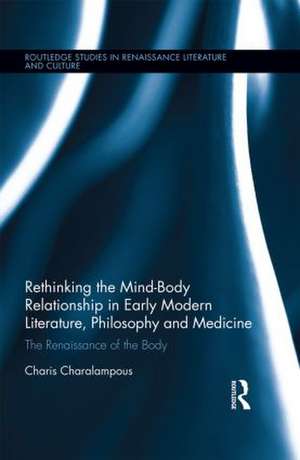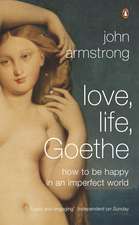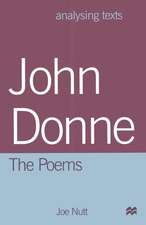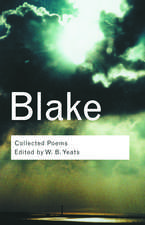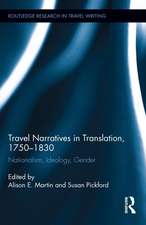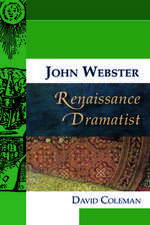Rethinking the Mind-Body Relationship in Early Modern Literature, Philosophy, and Medicine: The Renaissance of the Body: Routledge Studies in Renaissance Literature and Culture
Autor Charis Charalampousen Limba Engleză Hardback – 17 sep 2015
| Toate formatele și edițiile | Preț | Express |
|---|---|---|
| Paperback (1) | 381.00 lei 6-8 săpt. | |
| Taylor & Francis – 10 dec 2019 | 381.00 lei 6-8 săpt. | |
| Hardback (1) | 1105.24 lei 6-8 săpt. | |
| Taylor & Francis – 17 sep 2015 | 1105.24 lei 6-8 săpt. |
Din seria Routledge Studies in Renaissance Literature and Culture
-
 Preț: 326.26 lei
Preț: 326.26 lei -
 Preț: 714.58 lei
Preț: 714.58 lei -
 Preț: 310.09 lei
Preț: 310.09 lei -
 Preț: 485.40 lei
Preț: 485.40 lei -
 Preț: 339.89 lei
Preț: 339.89 lei -
 Preț: 446.95 lei
Preț: 446.95 lei - 18%
 Preț: 1053.95 lei
Preț: 1053.95 lei -
 Preț: 443.65 lei
Preț: 443.65 lei - 18%
 Preț: 1001.90 lei
Preț: 1001.90 lei - 18%
 Preț: 1110.77 lei
Preț: 1110.77 lei -
 Preț: 278.46 lei
Preț: 278.46 lei - 18%
 Preț: 1109.21 lei
Preț: 1109.21 lei - 18%
 Preț: 1053.16 lei
Preț: 1053.16 lei -
 Preț: 389.38 lei
Preț: 389.38 lei - 31%
 Preț: 763.81 lei
Preț: 763.81 lei -
 Preț: 440.97 lei
Preț: 440.97 lei - 31%
 Preț: 764.62 lei
Preț: 764.62 lei - 17%
 Preț: 321.08 lei
Preț: 321.08 lei - 26%
 Preț: 765.01 lei
Preț: 765.01 lei -
 Preț: 433.26 lei
Preț: 433.26 lei - 18%
 Preț: 1062.26 lei
Preț: 1062.26 lei - 18%
 Preț: 1111.40 lei
Preț: 1111.40 lei - 18%
 Preț: 1057.13 lei
Preț: 1057.13 lei - 18%
 Preț: 1061.22 lei
Preț: 1061.22 lei - 18%
 Preț: 1138.65 lei
Preț: 1138.65 lei -
 Preț: 387.49 lei
Preț: 387.49 lei - 18%
 Preț: 1053.92 lei
Preț: 1053.92 lei -
 Preț: 487.19 lei
Preț: 487.19 lei - 31%
 Preț: 762.57 lei
Preț: 762.57 lei -
 Preț: 416.22 lei
Preț: 416.22 lei - 18%
 Preț: 1111.55 lei
Preț: 1111.55 lei - 18%
 Preț: 1040.35 lei
Preț: 1040.35 lei - 18%
 Preț: 1000.27 lei
Preț: 1000.27 lei - 30%
 Preț: 847.73 lei
Preț: 847.73 lei - 30%
 Preț: 851.75 lei
Preț: 851.75 lei - 18%
 Preț: 1055.51 lei
Preț: 1055.51 lei - 18%
 Preț: 1050.09 lei
Preț: 1050.09 lei - 31%
 Preț: 765.77 lei
Preț: 765.77 lei
Preț: 1105.24 lei
Preț vechi: 1347.85 lei
-18% Nou
Puncte Express: 1658
Preț estimativ în valută:
211.51€ • 229.67$ • 177.67£
211.51€ • 229.67$ • 177.67£
Carte tipărită la comandă
Livrare economică 22 aprilie-06 mai
Preluare comenzi: 021 569.72.76
Specificații
ISBN-13: 9781138823914
ISBN-10: 1138823910
Pagini: 180
Ilustrații: 8 black & white illustrations, 8 black & white halftones
Dimensiuni: 152 x 229 x 15 mm
Greutate: 0.34 kg
Ediția:1
Editura: Taylor & Francis
Colecția Routledge
Seria Routledge Studies in Renaissance Literature and Culture
Locul publicării:Oxford, United Kingdom
ISBN-10: 1138823910
Pagini: 180
Ilustrații: 8 black & white illustrations, 8 black & white halftones
Dimensiuni: 152 x 229 x 15 mm
Greutate: 0.34 kg
Ediția:1
Editura: Taylor & Francis
Colecția Routledge
Seria Routledge Studies in Renaissance Literature and Culture
Locul publicării:Oxford, United Kingdom
Public țintă
Postgraduate and UndergraduateCuprins
1. Introduction: Intelligent Bodies in Early Modern Philosophy, Medicine and Literature 2. Montaigne’s Corporeal Self: A Dialectics of Bisubjectivity and its Medicinal Virtues 3. The Allegory of the Body and the Body of Allegory in Spenser’s The Faerie Queene 4. Thinking (of) Feelings: Reaching for the Divine in Donne’s Poetry 5. The Intelligent Body on the Stage and the Wonder of Tragic Pleasure 6. Milton’s Prophetic Mission: At the Boarders of Poetry and Music 7. Epilogue: The Afterlives of the Intelligent Body
Notă biografică
Charis Charalampous is the Toby Jackman Isaac Newton Research Fellow at St Edmund's College, Cambridge, UK.
Recenzii
“This study is a much-needed volume in a neglected field.” - Kate Gath, University of Sheffield, British Society for Literature and Science
Descriere
This book considers the works of early modern physicians, thinkers, and writers who explored the phenomenon of the independent and intelligent body, shedding new light on historical and literary issues relating to the treatment, perception, and representation of the human body. It examines the notion of the thinking body across a range of genres, topics, and authors, including Montaigne’s Essays, Spenser’s allegorical poetry, Donne’s metaphysical poetry, Shakespeare, and Milton. Visiting the consequences of this way of thinking about the body for contemporary philosophy, theology, and medicine, this book is essential for those studying early modern literature, cognition, and the body.
